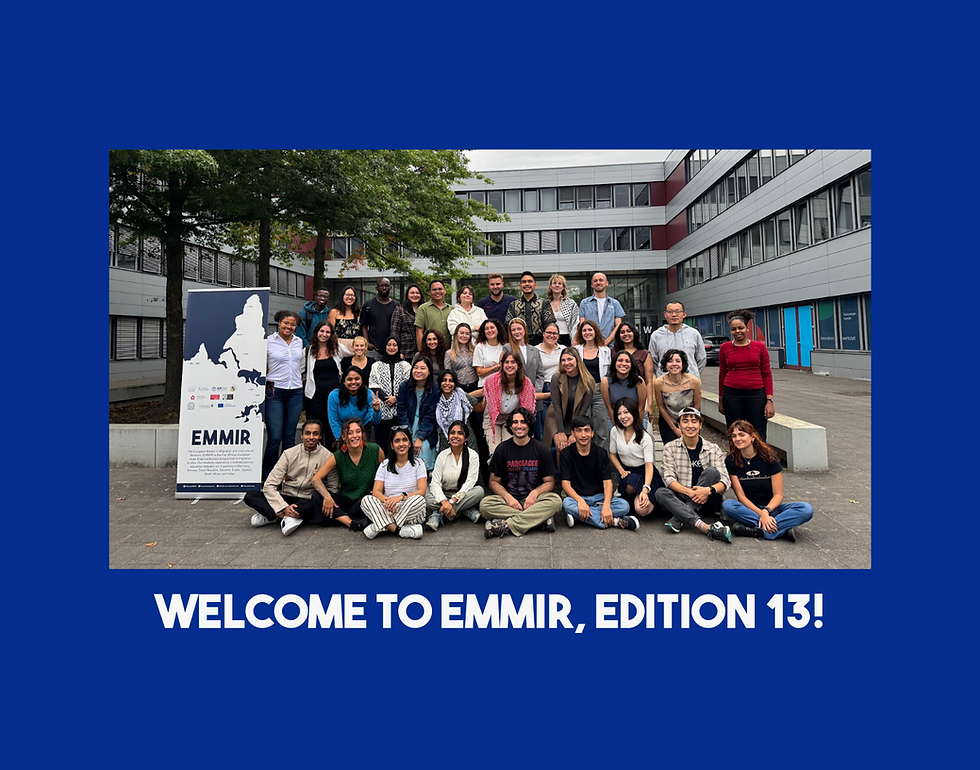Student blog post: Living in an extrovert-ideal world
- Dec 11, 2017
- 3 min read
Updated: Jul 12, 2024
By Tho Ngoc, Cohort 7
During the first semester at the University of Oldenburg, we had several sessions named “Navigating EMMIR” which focuses on self-reflection, and assessment of the program as a whole. One of the most common concerns raised in different “navigating” sessions is about who speak and who don’t speak in the class.
To speak or not to speak?
There are several reasons that some of us don’t speak in the class. It might be because some come from hierarchical education systems where lecturers are the only one to talk and students do not contribute much to knowledge production. It might also be because we think that we have no relevant knowledge and constructive opinions. But the reason can also lie in individual personality. We don’t speak, for a reason.
Similarly, there are various reasons that some of us frequently speak in the class. It might be because some are familiar with student-centered education where interaction between professors and students is significantly important and responsibility for the learning path is in the hands of students. Some of us speak also because we think that our information and knowledge should be shared and our opinion matters. But the reason can also lie in individual personality. We speak justifiably.
During “Navigating EMMIR”, we learned that few of us, mostly extroverts, felt uncomfortable about the dynamics of the class about which non-frequent speakers found totally okay. In retrospect, I realized the presence of an extrovert-ideal world in the EMMIR program.
An extrovert-ideal world
We are living in a world that idealizes many characteristics of an extrovert, namely good public speaking skill, teamwork ability and sociableness. Every school setting witnesses an increase in teamwork tasks, presentations, and extracurricular activities. Companies and organizations start to build open working space with only few individual rooms for top managers. At the same time, more and more people use social media and go to business or social meetings to expand their network. In this fast-paced, interconnected, and extrovert-ideal world, an introvert thinker who does not enjoy speaking, works surprisingly better when being alone, and prefer diving into a book to joining a party really struggles to fit in.
But wait a second, are contemplation and reticence really problems that need to be changed? Should we feel guilty because we enjoy staying at home and cooking ourselves rather than going to a great bar with our peers? Should we force ourselves spending time as much as possible with other people for fear of not getting to know them well enough? Are we miserably bored if we don’t know how to engage in small talks with new acquaintances?
For me, the answer would be: “Of course, not”. As human beings, fortunately, we are all different. I cannot imagine how life would be if everyone is innately extrovert and enjoy doing the same things. “So stay true to your own nature. If you like to do things in a slow and steady way, don’t let others make you feel as if you have to race. If you enjoy depth, don’t force yourself to seek breadth. If you prefer single-tasking to multi-tasking, stick to your guns. Being relatively unmoved by rewards gives you the incalculable power to go your own way.” (Susan Cain, in her book called “Quiet: The Power of Introverts in a World that can’t stop talking”).
Everything will be in the right place
Actually, I used to be a top-class extrovert student who felt naturally comfortable to speak in front of public audience. Never in my life had I wondered whether I should raise my hand or not. But it was exactly what happened to me during the first few weeks of EMMIR program. I was so overwhelmed by all the new knowledge and different perspectives of international friends that it took me so long to decide what my opinion was. And before I knew what I thought about certain topics, people had started talking about other things. I was dumbfounded and freaked out for the first one month, feeling uncomfortable about my lack of knowledge and lack of participation in the class. However, as time flies, especially thanks to all the “Navigating EMMIR” sessions and small talks among EMMIR friends, I find out that it is not a big deal, at all. It is totally okay to spend time thinking without articulating. All one needs are to be aware of what one is doing and what one is living for.
In the first semester, we devoted a lot of time talking about integration, multiculturalism and intercultural relations which all relate to an inclusive society which embraces differences and respect. I am deeply grateful for being among a diverse group of respectful and open people. And I hold the belief that we will unexpectedly learn a lot of valuable lessons, not only from professors but also from our peers.



Comments